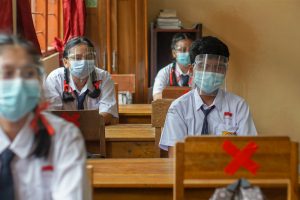Indonesia’s government is reportedly planning to enact stricter lockdown measures shortly in a bid to contain the spiraling rise in COVID-19 cases that has pushed the country’s hospital capacity to its limits.
As I noted last week, Indonesia has experienced a rash of record daily caseloads over the past week as it fights to contain a determined new wave of coronavirus infections, driven by the highly transmissible Delta variant and increased mobility around the Eid al-Fitr holiday in May.
The nation’s health authorities notched another new record of 21,807 cases today, following 20,467 cases yesterday, pushing its total beyond 2.15 million, the highest number of confirmed infections in Southeast Asia. The country has also seen 58,024 deaths from the disease since the start of the pandemic.
A spokesperson for coordinating maritime affairs and investment minister Luhut Pandjaitan, whom President Joko Widodo has appointed COVID-19 emergency coordinator for Java and Bali, said yesterday that the government was “currently formulating stricter measures that it will take” and would make an official announcement soon.
According to Singapore’s Straits Times, which quoted an anonymous government official, the new restrictions will force all “non-essential” workers to work from home and ban in-restaurant dining. Domestic air travel will only be allowed only for those who have been vaccinated and can produce negative test results.
The Times reported that the planned new measures, called Pemberlakuan Pembatasan Kegiatan Masyarakat Darurat, or PPKM Emergency, could come into force on July 3. They will likely cover Java, Indonesia’s most densely populated island, and Bali, which had been hoping to open to foreign tourism at the end of next month.
Tighter restrictions are arguably long overdue. Under the current color-coded COVID-19 system, designated “red zones” are subject to tough restrictions, but Indonesia has in other respects remained relatively laissez faire in its containment and lockdown efforts, banking on mass vaccination as a ladder out of the COVID-19 crisis. For instance, domestic air travel has continued throughout the recent outbreak, facilitating the spread of the virus to far-flung parts of the archipelago.
Yesterday, the Red Cross warned that without swift action Indonesia stood on the brink of a coronavirus “catastrophe.” “Every day we are seeing this Delta variant driving Indonesia closer to the edge of a COVID-19 catastrophe,” Jan Gelfand, head of the International Federation of the Red Cross in Indonesia said in a statement. “We must focus on getting vaccinations into the arms of those most at-risk and all adults everywhere to contain this virus.”
As the infections have continued to surge, hospitals in several designated “red zone” areas, including the capital Jakarta, have reported overcapacity. According to Reuters, isolation beds in Jakarta’s hospitals were 93 percent occupied as of June 27.
As patients begin to be turned away from hospitals, some people sought to secure oxygen for infected family members at home, pushing up the price of the vital resource. Reuters reported yesterday that the price for a tank of oxygen had nearly tripled from $50 to $140, echoing the dire shortages that accompanied India’s recent COVID-19 wave.
As expected, the continued outbreak has also delayed Indonesia’s plans to reopen Bali to foreign tourists. The government announced yesterday that it will wait until COVID-19 cases fall significantly before welcoming back foreign visitors to Bali. COVID-19 has spread more slowly in Bali, but has still risen fourfold in the past month to about 200 cases per day, according to official data.
Despite plans to inoculate 181.5 million people by the end of 2021, less than 5 percent of Indonesia’s 270 million people had been fully vaccinated as of Tuesday, according to the Our World In Data tracker. Around 27.4 million – just over 10 percent – have received their first dose.

































